Like many people this month, I have been watching the news pouring out of Hawaii describing the apocalyptic scenes in Maui, a tropical paradise ravaged by wildfires. I imagine also like many of us I have felt the compelling urge to provide assistance in the spirit of what Wake Foresters understand as Pro Humanitate.
But my perspective is unique. I am the executive officer (second in command) onboard USS Jackson, a high-speed warship that provides maritime security and deterrence but is currently deployed on a humanitarian mission. As I write this the Jackson is operating in the central Pacific Ocean, 2,200 nautical miles southwest of Maui — about a seven-day transit away. We are loaded with disaster relief supplies and taking part in the world’s largest humanitarian assistance operation, Pacific Partnership. But in a cruel twist of fate, we are an ocean away from those who need our help most. We are ready — even eager — to respond, but for now, life at sea affords time to reflect, and my mind drifts to childhood and North Carolina.
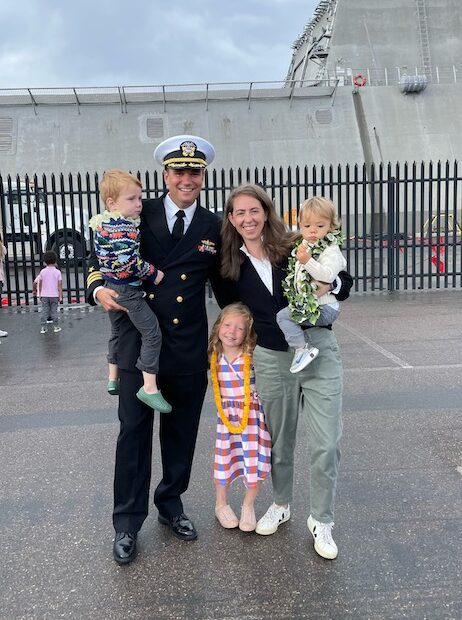
Matt Farrell ('05) with his wife, Mallory Boutin ('08), and their children
My childhood and my four years at Wake Forest set me on the path to this ship in the middle of the vast Pacific — thousands of miles from my wife and three kids — and molded my conception of Pro Humanitate: the duty to apply your talents and resources for the betterment of others, often through sacrifice. I grew up the son of a naval officer and elementary school teacher. They instilled in me a sense of duty and taught me to value service, and that service comes in many forms.
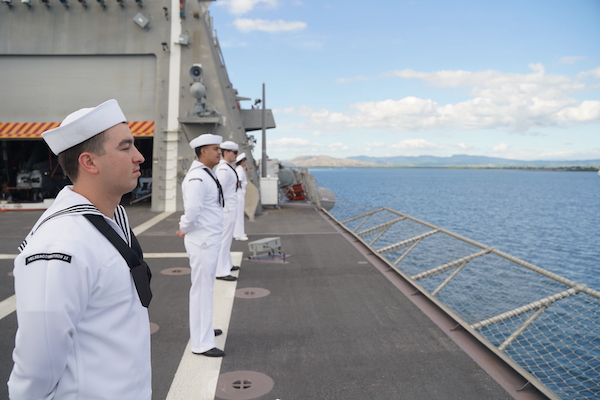
The USS Jackson arriving in Lautoka, Fiji, on Aug. 3 for Pacific Partnership (Photo top and above by Mass Communication Specialist 2nd Class Deirdre Marsac)
Two weeks after my freshman move-in day into Collins Residence Hall, I gathered in the dorm lounge and watched the events of 9/11 unfold on live TV. We were still kids, many of us living away from home for the first time. That day, my classmates and I became more aware of the world’s complexities and dangers, and the collective effort and sacrifice required to face those challenges head on. In philosophy class that semester with Professor Marcus B. Hester (’60), I began to wrestle with defining the goodness of people and actions as we entered the sometimes complementary but often conflicting worlds of Aristotle, Kant and Mill.
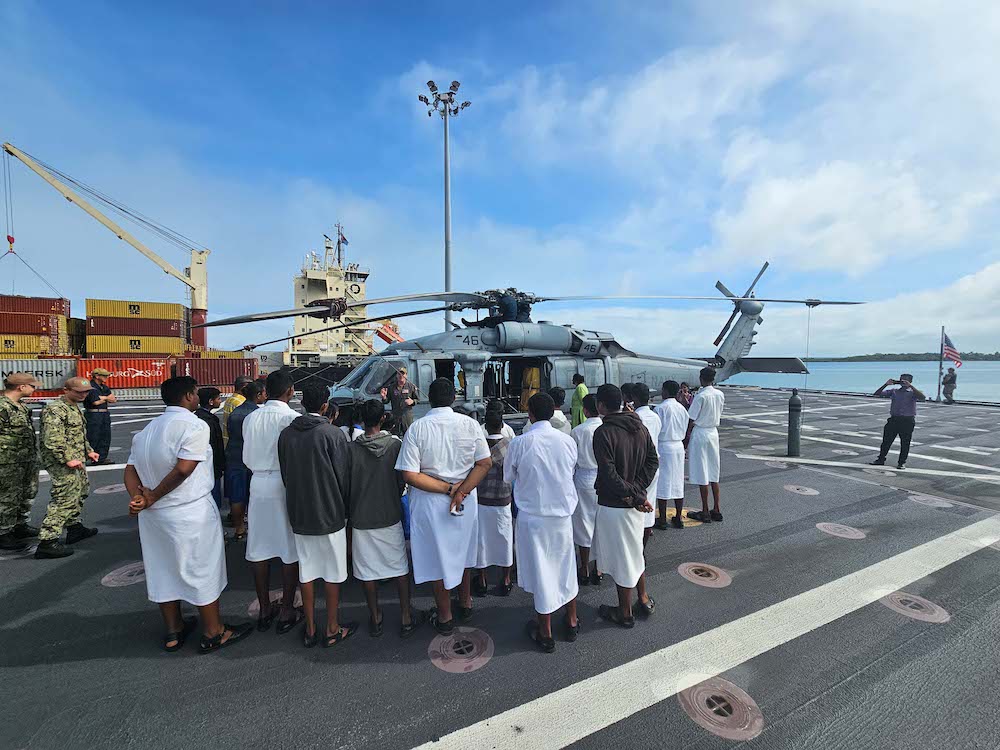
Students and staff from the Lautoka Andhra Sangam College learn about aircraft aboard the USS Jackson during a tour at Pacific Partnership. (Photo by Daniel Mendoza)
Junior year I studied abroad in Barcelona, Spain, a profoundly transformative experience that exposed me to a new world and worldviews that challenged my way of thinking. During my time in Barcelona and elsewhere in Europe I met people staunchly against U.S. foreign policy actions in Afghanistan and Iraq, a significant contrast to the largely pro-military, pro-Global War on Terror sentiment prevalent in the two years following 9/11 in the United States. I became a more thoughtful citizen of the world and learned to think and live outside my comfort zone.
These influences and others fed off each other, and by the end of my junior year, all I knew was that it was a big world out there and I wanted to lead, serve and make a positive change. Looking back, I am struck by both the boldness and childlike simplicity of the 21-year-old me. I applied to U.S. Navy Officer Candidate School while also prepping for the LSATs. I ultimately decided to join the U.S. Navy and never applied to law school. That was 19 years ago.
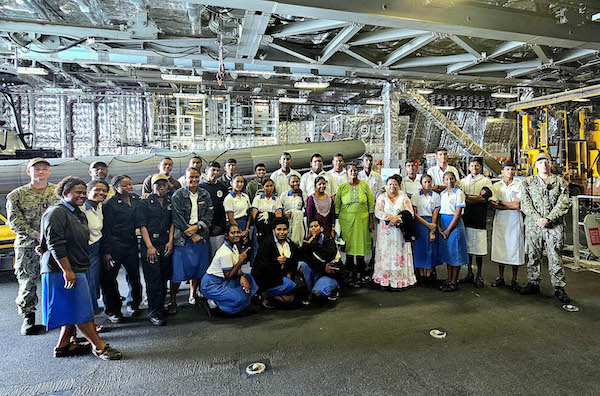
Students and staff from the Lautoka Andhra Sangam College during Pacific Partnership (Photo by Daniel Mendoza)
To some, a career in the Navy may not immediately invoke Pro Humanitate. Hollywood highlights the Navy’s involvement in war and overlooks its role in peacetime. Throughout our country’s history, the Navy’s focus has been deterrence of armed conflict more often than response to armed aggression. Since the end of World War II, the Navy has ensured the freedom of navigation vital to the massive increase in global maritime-based commerce that has helped bring millions of people out of poverty worldwide, increasing political, economic and human security.
The Jackson’s current deployment, Pacific Partnership, is emblematic of Pro Humanitate through its focus on military and civilian organizations working collectively to ensure the international community is better prepared to synchronize when executing effective responses in the aftermath of a disaster emergency. To that end, the Jackson is in the central and southern Pacific, ready to assist in crises that might emerge throughout the Pacific Rim of Fire, such as in Vanuatu, Fiji, Tonga and Papua New Guinea.
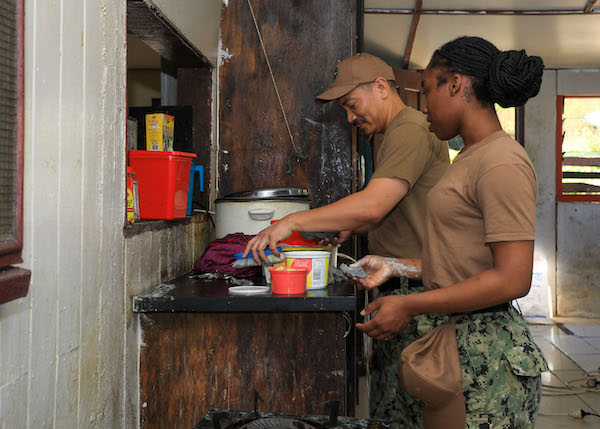
Gas Turbine Systems Technician 1st Class Arbie Millanes (left) and Culinary Specialist 3rd Class Jordan Brantley, assigned to the USS Jackson, clean a wall in the kitchen of the Veilomani Home for Boys during Pacific Partnership. (Photo by Deirdre Marsac)
I discuss the events on Maui with the Jackson’s crew members, some of whom have family in Hawaii. We are well-equipped to conduct search and rescue operations, fly supplies ashore and support helicopter-based firefighting efforts. We reluctantly acknowledge that the National Guard, U.S. Coast Guard and FEMA are much closer to Maui and already on the ground, but it is a tough pill to swallow. The Army, Navy and Air Force have significant resources on Oahu, ready, like the Jackson, to respond if directed. But sometimes throwing every resource at a problem can complicate the solution. Nevertheless, it is difficult to shake the feeling that we are well-trained for a race on home turf but unable to get to the starting line.
I have a strong attachment to Hawaii, having lived there for four years as a kid. Deployments have brought me to Hawaii — including Lahaina — more times than I can count during my more than 17 years of naval service. A tough pill indeed.
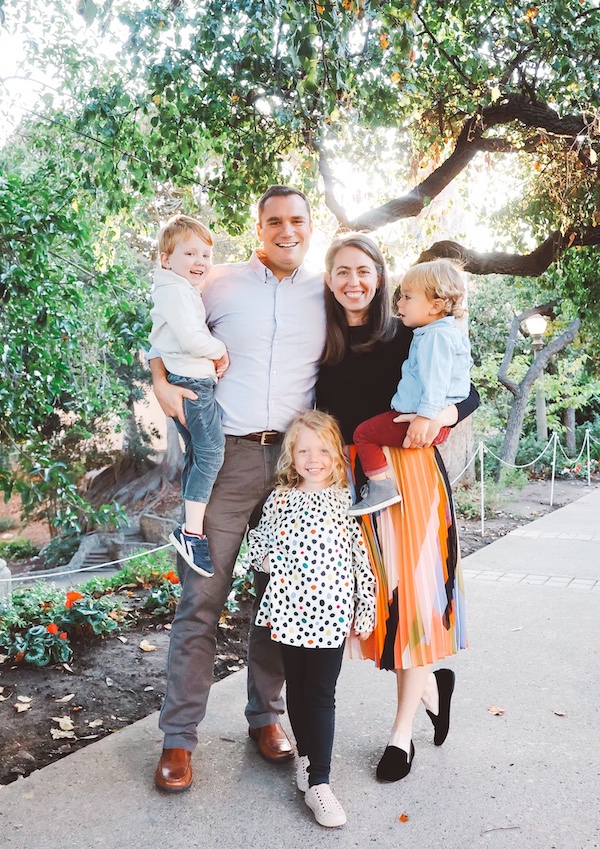
My time in the Navy has afforded me the opportunity to try to embody Pro Humanitate ideals around the world, but it has required sacrifice. My wife, Mallory Boutin (’08), has sacrificed the most. She gave birth to our oldest while I was deployed and, while I am gone, takes care of our children, ages 6, 4 and 2 and all born in different states. She somehow manages to work full time as a consultant in the financial services industry. Doctor appointments, meals, school meetings, sports practices — she does it all during the hectic few months leading up to deployment and while I’m at sea. She has been forced to adapt in her career during our multiple cross-country moves.
And for my part, the feeling of disconnection from everything back home is difficult to describe: I miss my family deeply. But there is purpose behind the sacrifice. Pro Humanitate requires us to believe that our actions, our purpose, further some greater good worth the personal cost. This in turn requires a sense of humility and a willingness to put others before self. For me, Pro Humanitate has been a lifelong lesson, and I am grateful for Wake Forest’s contribution.
Matt Farrell (’05) is a commander in the U.S. Navy and executive officer onboard USS Jackson (LCS 6). He received an M.A. in National Security and Strategic Studies at the U.S. Naval War College and an M.P.S. in Leadership, Education and Development from the University of Maryland. His deployments have ranged from three to 10 months. When not at sea, he lives in San Diego with his wife, Mallory Boutin (’08), and their three children.
Photo disclaimer: The appearance of U.S. Department of Defense (DoD) visual information does not imply or constitute DoD endorsement.


